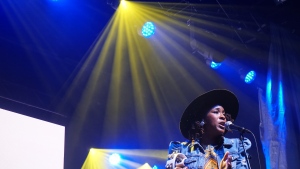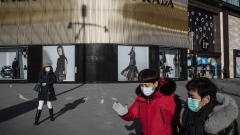May 2, 2020
'That's over': How COVID-19 could change live music as artists eye new revenue streams
, BNN Bloomberg
Live events industry seeing 'total economic devastation': Bell Media head of music
For music fans, reality quickly set in when the COVID-19 pandemic went global — it could be a long time before anyone goes to another concert.
Social distancing protocols, maximum crowd controls, travel, and border restrictions are some of the factors that stand in the way before musicians can even begin thinking about hitting the road again, if the entire touring model even survives the pandemic.
“If you think you can just come in, and suck money from people, and rip them off and stuff them into a hockey arena and sell them a $60 t-shirt and send them home? That’s over,” Torquil Campbell, co-lead singer of the Montreal-based band Stars, said in a phone interview with BNN Bloomberg. “And I don’t think that that’s a bad thing.”
The global live music business was worth about US$28 billion last year, according to a recent PricewaterhouseCoopers report, but that revenue could be on ice as the global pandemic has forced some artists to turn to alternative revenue streams to survive.
Some acts have monetized live streams during the lockdown through platforms like StageIt, while others have started online tip drives or embraced subscription content services like Patreon which offers fans direct means to support their favourite artists.

“The music industry was f---ed before this began, and we had been in the game long enough to see that in very clear ways,” Campbell said.
Stars launched their Patreon account in November to modest success. Nearly 1,000 of the band's fans signed up to get access to exclusive content – unreleased tracks, artist Q&A’s, curated playlists – for a monthly US$5 fee.
Toronto-based soul singer Tanika Charles was in the middle of touring behind her latest record The Gumption when the live industry halted. She thinks the music business could become a steeper mountain to climb for artists once the pandemic is over.
“I’m worried there will be a residual hesitation for people to come out to events even after things settle down,” Charles told BNN Bloomberg via email. “There will also be significant competition to book venues once they’re back online, and that’s assuming venues can survive in this downtime.”
The federal government has played a role in supporting the arts, as Heritage Canada earmarked $500 million this month to support arts, culture and sports. One key element of that package is that royalty payments would not prevent artists from qualifying for the $2,000-a-month Canada Emergency Response Benefit.
“We lost all or nearly all income for March and April, and perhaps for the rest of the year,” Charles said of the necessity of CERB, not only for artists, but support musicians, tech crews and venue staff. “We are used to living frugally and can find ways to survive in such times ... It doesn’t lessen the anxiety and stress, but it’s a light at the end of the tunnel.

Even Campbell, an avowed “lifetime NDPer” said he was “super impressed” with the government’s moves to prop up the arts. However, he added that the pandemic fallout will force a necessary change in how musicians and the industry itself operate.
While Campbell says the Patreon set-up is “not a living yet” for the band, its nearly-1,000 subscribers are definitely making a difference.
“We make three times off our Patreon than we make off of 9 million streams per year on Spotify,” Campbell said.
Music industry players have also taken steps to support artists. Online music retailer Bandcamp waived its revenue share for every purchase on March 20, resulting in $4.3 million in sales in one day. It plans to repeat the offer once a month through July.
Streaming giant Spotify Technology S.A. agreed to match individual donations to 14 music funds worldwide - including the Recording Academy’s MusiCares fund and Canada’s Unison Benevolent Fund - up to a combined total of US$10 million.
Bands may embrace a more local approach to live gigs on the other side of the pandemic, which could provide a higher return for artists that are able to manage expectations, Campbell said.
“This is an opportunity, I think, for musicians to get in touch with their actual, physical, geographical communities. And, not think of themselves anymore as this floating free agent,” he said.
“If I only spend $300 to rent a PA, and 500 people come and pay $20 each to see a show, why am I spending $60,000 to [play a show in] Singapore?”





